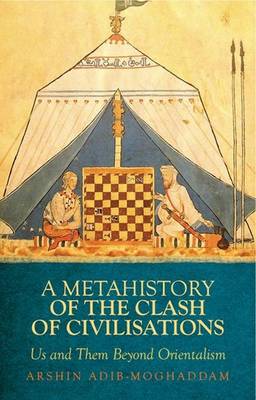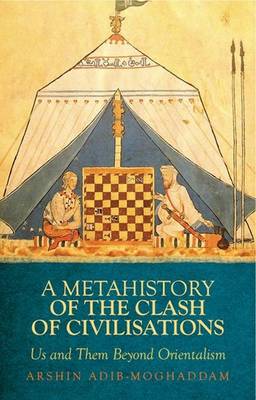
- Afhalen na 1 uur in een winkel met voorraad
- Gratis thuislevering in België vanaf € 30
- Ruim aanbod met 7 miljoen producten
- Afhalen na 1 uur in een winkel met voorraad
- Gratis thuislevering in België vanaf € 30
- Ruim aanbod met 7 miljoen producten
Zoeken
A Metahistory of the Clash of Civilisations
Us and Them Beyond Orientalism
Arshin Adib-Moghaddam
Paperback | Engels
€ 48,45
+ 96 punten
Omschrijving
This book seeks to dispel the myth that we have ever been embroiled in some "clash of civilisations." Adib-Moghaddam traverses various intellectual disciplines in order to find a pathway through the conceptual maze that has habituated us to think in "tribal" categories. Accompanying the reader on this journey from the wars between ancient Persia and Greece, the Crusades, Colonialism and the Enlightenment to the contemporary "wars on terror" are thinkers from "East" and "West" Adorno, Derrida, Farabi, Foucault, Hegel, Khayyam, Marcuse, Marx, Said, Ibn Sina, Weber. In asking where ideas such as the "clash of civilisations" come from, and by whom they are perpetuated, Adib-Moghaddam engages with both western and Islamic representations of the "other." He demonstrates a) the discontinuities between 'Islamism' and the canon of classical Islamic philosophy distinguishing between "Avicennian" and "Qutbian" discourses of Islam, and b) how the violence inscribed in the idea of the "West," especially during the period of the Enlightenment, continues to cast a shadow on world politics today. Expanding the geography of critical theory to include the canons of Islamic philosophy and poetry, A Metahistory of the Cash of Civilisations refuses to divorce Muslims from Europeans, Americans from Arabs, the Orient from the Occident. As such, it presents a frontal attack on our current cultural reality and Islamist-Western agitation against each other.
Specificaties
Betrokkenen
- Auteur(s):
- Uitgeverij:
Inhoud
- Aantal bladzijden:
- 288
- Taal:
- Engels
Eigenschappen
- Productcode (EAN):
- 9780199333523
- Verschijningsdatum:
- 16/01/2014
- Uitvoering:
- Paperback
- Formaat:
- Trade paperback (VS)
- Afmetingen:
- 140 mm x 213 mm
- Gewicht:
- 453 g

Alleen bij Standaard Boekhandel
+ 96 punten op je klantenkaart van Standaard Boekhandel
Beoordelingen
We publiceren alleen reviews die voldoen aan de voorwaarden voor reviews. Bekijk onze voorwaarden voor reviews.











